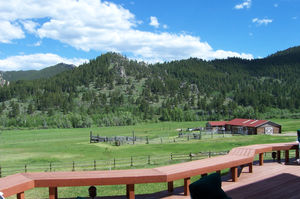Forget about the economy -- libertarians expect Democrats to be horrible statists in economic matters. But we hope to get some protection of civil liberties in exchange. But Obama has been simply awful in this area as well -- prosecuting marijuana sellers that are legal under state law, claiming assassination powers, the drone war, wiretapping, failure to address gay marriage, etc.
Here is but one example - the Orwellian defense of warrantless wiretapping. You can't sue us unless we tell you there is a wiretap, and we are not going to tell you.
As part of its concerted campaign to prosecute whistleblowers and to classify state secrets, the Obama administration has taken a position in Clapper that makes the Bush administration pro-secrecy campaign seem pale in comparison: namely, that no one can challenge warrantless surveillance unless the government tells you in advance that you’re being surveilled—which national security interests prevent it from doing. When Bush administration offered milder versions of the same arguments, the civil liberties community rose up in protest. Verrilli, for his part, was met by vigorous skepticism from the Supreme Court’s liberal justices.
It’s unfortunate enough that the administration asked the Court to hear the surveillance case in the first place, after the U.S. Court of Appeals for the Second Circuit had ruledthat the plaintiffs —lawyers and human rights and media organizations whose work requires them to communicate with clients, sources, and victims of human rights abroad—had legal standing to bring the case. Although they couldn’t be 100 percent sure that their telephone communications were being monitored, the appellate held that there was a “realistic danger” that their telephone communications were being monitored under the FISA Amendments Act of 2008 (FAA), passed by Congress to codify some of the worst excesses of the Bush administration’s warrantless wiretapping program. This led the journalists and lawyers to suffer tangible injuries—such as having to fly to the Middle East to communicate with clients rather than talking by telephone, for example, or being more circumspect in talking to Middle Eastern sources, as journalists such as Naomi Klein and Chris Hedges alleged.
In his Supreme Court brief and in the oral argument yesterday, however, Verrilli alleged that these harms were too speculative to create legal standing to challenge the law, since the lawyers and journalists couldn’t be sure they were being surveilled under the FAA rather than under some other warrantless wiretapping authority. Essentially, the Obama administration was arguing that targets of surveillance could only challenge the law after they knew they were being surveilled, though the government would never tell them they were being surveilled before bringing a case against them.
I am sure we would all like a ruling that we cannot be sued unless we give the plaintiff permission to do so, essentially what the Obama Administration is claiming here.
Update: From the Washington Times:
Bloomberg News reported on October 17 that Attorney General Eric Holder “prosecuted more government officials for alleged leaks under the World War I-era Espionage Act than all his predecessors combined, including law-and-order Republicans John Mitchell, Edwin Meese and John Ashcroft.” :
The Justice Department said that there are established avenues for government employees to follow if they want to report misdeeds. The agency “does not target whistle-blowers in leak cases or any other cases,” Dean Boyd, a department spokesman, said.“An individual in authorized possession of classified information has no authority or right to unilaterally determine that it should be made public or otherwise disclose it,” he said.
However, when leaks to the press benefit the administration, prosecutions from the Jusitce Department are absent. For example, AG Holder was not prosecuting anyone over who leaked information about the killing of Oasma bin Laden. The Justice Department has yet to charge anyone over leaking information regarding the U.S. involvement in cyberattacks on Iran as well as an al Qaida plan to blow up a U.S. bound airplane. In fact, the Justice Department ended up appointing one of two attorneys to the cyberattacks investigation who was an Obama donor.
Part of the problem is that if this (or any other) Administration has its way, information that embarrasses the Administration get's classified, on the dubious logic that embarrassing the Administration embarrasses America. With this definition, all whistle-blowing becomes "espionage".
Update 2: More on Wiretapping from the EFF
To the contrary, there’s no indication that the still-active warrantless wiretapping program—which includes a warrantless dragnet on millions of innocent Americans’ communications—has significantly changed from the day Obama took office. With regard to the FISA Amendments Act, the Obama Administration has actively opposed all proposed safeguards in Congress. All the while, his Administration has been even more aggressive than President Bush in trying to prevent warrantless wiretapping victims from having their day in court and hascontinued building the massive national security infrastructure needed to support it. ...
Some have suggested it’s possible when Obama said “safeguards” on the Daily Show, he is referring to some unspecified secret administrative rules he has put into place. Yet if these “safeguards” exist, they have been kept completely secret from the American public, and at the same, the administration is refusing to codify them into the law or create any visible chain of accountability if they are violated. But given the ample evidence of Constitutional violations since Obama took office (see: here, here, and here), these secret safeguards we don’t know exist are clearly inconsequential.

